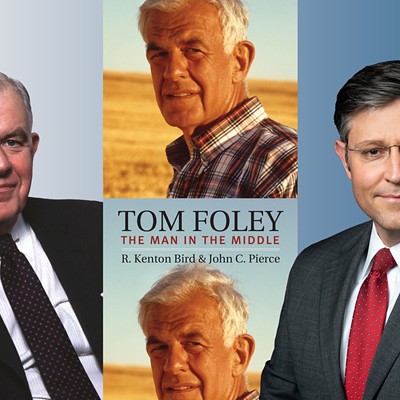Hang on to your earmuffs, folks. This 2012 presidential election year is going to be a wild ride. It’s only January, and the airwaves are already carrying a heavy load of campaign rhetoric and punditry. And it’s all driven by money, money, money.
We are beginning to see the results of the Supreme Court decision commonly known as Citizens United, which decreed that corporations and labor unions can give unlimited amounts of money to independent political campaigns — and do so draped in anonymity.
For years, many election junkies I know have muttered that the huge amounts of dollars plowed into American political elections are disgustingly obscene. Well, we’re just glimpsing the tip of the 2012 obscenity iceberg.
So far, Mitt Romney’s super PAC, Restore Our Future, has reportedly spent $ 7.7 million alone on negative attack ads against Newt Gingrich. That’s the largest expenditure so far — and they’re only getting started.
The reason Republican candidates for president have been able to stay in the race as long as they have is the big help they have received from their friends who have formed super PACS to pad the way.
Now PACs — political action committees — have been around for a long time. But super PACs are a fairly recent development, and they merit the label “super” because they can raise unlimited amounts of money as long as they are completely independent of the candidate’s campaign organization. Super PACs can also raise unlimited super-gobs of money from corporations.
This strange conundrum is brought to you courtesy of the Supreme Court, five members of which have divined that corporations have inherited, through the First Amendment, all the rights the Constitution has granted to live, flesh-and-blood Americans.
In a weird, circuitous transformation understood only by lawyers, corporations have become people. Granted corporate personhood, corporations’ political speech has become free, and money has become speech.
Abacadabra!
So we are stuck with two theorems, neither of which can pass the sniff
test of common sense. 1) Corporations have all the rights that real
people do in regard to political speech. 2) Money equals speech, so free
speech means unlimited money if you have it to give or to spend.
I know you’ve already been made painfully aware of the Citizens United decision. I’m just trying to feed your pain. Repetition is helpful to underscore how ludicrous the legal premise is and how dangerous the consequences of its application may be to our democratic form of government.
What do you think our founding fathers, such as James Madison or Thomas Jefferson, would think of this nonsensical quandary? Certainly current-day journalists are aiming a lot of ridicule at “corporate personhood” and its consequences.
So let’s ridicule it whenever we get a chance. We’ve all heard the jokes: “Corporations are OK, but I wouldn’t want my sister to marry one,” or “ Corporations can’t eat, drink, make love or ride a bicycle” or “I’ll believe corporations are people when Texas executes one.”
On The Colbert Report, comedian/commentator Stephen Colbert, candidate for president of the United States of South Carolina, has hilariously lampooned the “independent” relationship of a candidate’s campaign with its super PAC by turning over the reins of his own super PAC, Americans for a Better Tomorrow, Tomorrow, to his good buddy, Jon Stewart. Their wink-and-nod style of communication sums up what’s really going on here.
If you’re curious, go to opensecrets.org, the website of the Center for Responsive Politics, to learn more about the buckets of money the super
PACs have to distribute for or against political candidates. And, totally incidentally, there you’ll even see that candidate Colbert, with his PAC, Americans for a Better Tomorrow, Tomorrow, has paid $21,600 for a TV ad.
As I noted
above, ridicule is not a bad way to get attention. The Colbert-Stewart
caper fits a category all its own. It’s called going from the Supreme to
the ridiculous.
On a more positive note, let me add my kudos to those offered by Robert Herold in this space last week (“Montana Strikes Back”) to the Montana Supreme Court for choosing to bypass the U.S. Supreme Court and uphold the continued value of its 1912 state law forbidding corporations to donate corporate funds to political candidates.
Mark Twain wrote that the outrageous W.A. Clark, who bribed the Montana Legislature into sending him as a U.S. Senator to Washington, D.C., “bought legislators and judges as other men buy food and raiment, and has so excused and so sweetened corruption that in Montana it no longer has an offensive smell.”
That was then, and now is now. Montana’s Supreme Court decision smells pretty sweet to me. Let’s hope it can stand up to the forces that brought us Citizens United.
Mary Lou Reed lives in Coeur d’Alene.






















